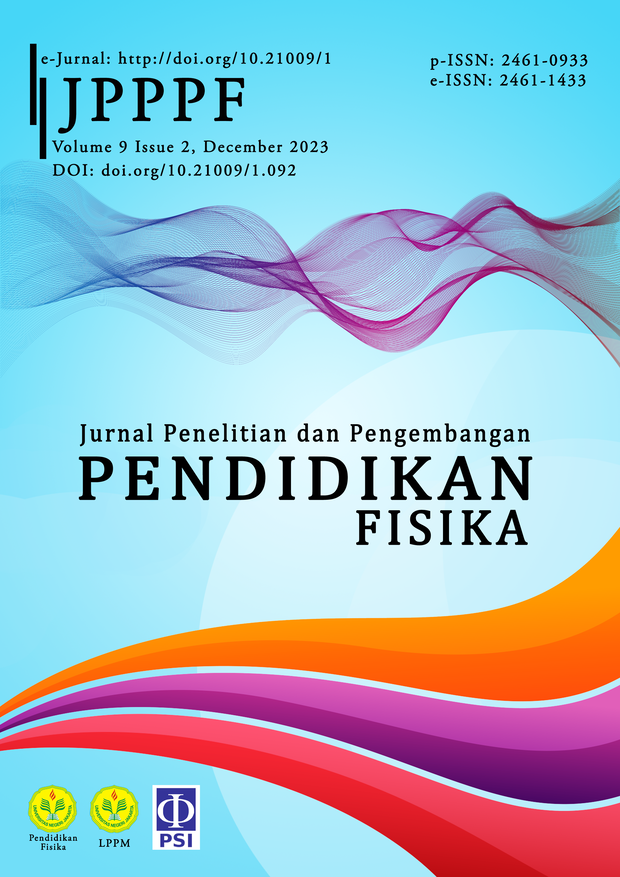Development of STEM-Based Physics E-Module with Self-Regulated Learning to Train Students’ Creative Thinking Skills
DOI:
https://doi.org/10.21009/1.09202Keywords:
e-module, STEM, self-regulated learning, creative thinking skillsAbstract
Twenty-first century skills are recognized as a competency standard that students need to possess to support the demands of success both in work and in life in the future, especially in learning. In line with this, learning that can accommodate 21st-century skills is learning that has a balance between the scientific approach and the use of technology. One of the efforts that can be made is to develop teaching materials in the form of electronic modules that integrate Science, Technology, Engineering, and Mathematics (STEM) to train creative thinking skills that are also adjusted to the applicable school curriculum. However, most of the teaching materials, especially the modules that are used in general, are only printed modules. Based on these problems, we need electronic modules (e-modules) that direct students to have 21st-century skills and the dimensions that exist in the independent learning curriculum. This study aims to develop an e-module based on STEM and self-regulated learning about global warming topics to train students’ creative thinking skills. This type of research involves adapting a 4-D development model. Which consist of defining, designing, developing, and disseminating. The data were gathered through questionnaires and tests. The questionnaire instrument consists of an expert validation questionnaire of three experts. Meanwhile, the test instrument consisted of a pre-test and a post-test, which were tested on 32 students in class X majoring in science. The N-gain score for creative thinking skills is 0.60 in the medium category. Based on the results of this study, the development of a STEM-based physics e-module with self-regulated learning on the global warming topic can train students' creative thinking skills.
References
Aprianti, R, Nadiyyah, K, Yekti, V, Gusti, K & Herliana, F 2023, ‘The Development of Physics E-Module CTL-Based for Reflection and Refraction of Light Topic’, Jurnal Penelitian dan Pengembangan Pendidian Fisika, vol. 9, pp. 23-34.
Astra, IM, Tumijan, P, Uskenat, K & Henukh, A 2023, ‘The Development of STEM-Based Science Teaching Materials on Simple Electrical Circuit Materials’, Jurnal Penelitian dan Pengembangan Pendidian Fisika, vol. 9, pp. 127-38.
Azwar, S 2015, ‘Reliabilitas dan Validitas’, Pustaka Pelajar, Yogyakarta.
Darmawansah, D, Hwang, GJ, Chen, MRA & Liang, JC 2023, ‘Trends and research foci of robotics-based STEM education: a systematic review from diverse angles based on the technology-based learning model’, International Journal of STEM Education., vol. 10, pp. 2-24, doi.org/10.1186/s40594-023-00400-3.
Dewi, HR, Mayasari, T & Handhika, J 2019, ‘Increasing Creative Thinking Skills and Understanding of Physics Concepts Through Application of Stem-Based Inquiry’, Jurnal Penelitian Pendidikan IPA, vol. 4, pp. 25-30.
Febrian, A, Salehudin, A & Zakirah, F 2023, ‘Feasibility of Biophysics Flipbook on Respiration System Content for Junior High School Student’, Jurnal Penelitian dan Pengembangan Pendidian Fisika, vol. 9, pp. 1-10.
Gunawan, PIY & Amaludin, A 2021, ‘Pemanfaatan teknologi pembelajaran dalam jaringan di masa pandemi covid-19’, Jurnal Madaniyah, vol. 11, pp. 133-50.
Kemendikbudristek 2022a, ‘Buku Saku: Tanya Jawab Kurikulum Merdeka’, Kemendikbudristek, pp. 9-46, Online: http://repositori.kemdikbud.go.id/id/eprint/25344.
Kemendikbudristek 2022b, ‘Dimensi, Elemen, dan Subelemen Profil Pelajar Pancasila pada Kurikulum Merdeka’, Kemendikbudristek, pp. 1-37.
Kurniawan, A, Tantri, ID & Fian, K 2023, ‘Effectiveness of STEM-Based Lectora Inspire Media to Improve Students ’ HOTS in Physics Learning’, Jurnal Penelitian dan Pengembangan Pendidian Fisika, vol. 9, pp. 55-66.
Lestari, N & Apsari, N 2022, ‘e-Modul Ethnophysics for Critical Thinking Skills in the Covid-19 Pandemic’, Jurnal Penelitian dan Pengembangan Pendidian Fisika, vol. 8, pp.193-206.
Lock, RM, Hazari, Z & Potvin, G 2019, ‘Impact of out-of-class science and engineering activities on physics identity and career intentions’, Physical Review Physics Education Research, vol. 15, pp. 1-11.
Novitra, F, Festiyed, Yohandri & Asrizal 2021, ‘Development of Online-based Inquiry Learning Model to Improve 21st-Century Skills of Physics Students in Senior High School’, Eurasia Journal of Mathematics, Science and Technology Education, vol. 17, pp. 1-20.
OECD 2017, ‘Creative Thinking Strategic Advisory Group Report, Organisation for Economic Co-Operation and Development’, Organisation for Economic Co-operation and Dev, pp. 1-17, Online: https://one.oecd.org/document/EDU/PISA/GB(2017)19/en/pdf.
OECD 2019, ‘PISA 2021 Creative Thinking Framework’, PISA 2018 Assessment and Analytical Framework, vol. 53, pp. 1689-1699, Online: https://www.oecd.org/pisa/publications/PISA-2021-creative-thinking-framework.pdf.
Parno, Supriana, E, Yuliati, L, Widarti, AN, Ali, M & Azizah, U 2019, ‘The influence of STEM-based 7E learning cycle on students critical and creative thinking skills in physics’, Inernational Journal of Recent Technology and Engineering, vol. 8, pp. 761-769.
Partnership for 21 st Century Skills 2015, ‘Partnership for 21St Century Skills-Core Content Integration’, pp. 1-70, Online: www.P21.org.
Restu Rahayu, Rita Rosita, Yayu Sri Rahayuningsih, Herry Hernawan, P 2021, ‘Implementasi Kurikulum Merdeka Belajar di Sekolah Penggerak’, Jurnal basicedu, vol. 5, pp. 2541-2549, doi.org/10.31004/basicedu.v5i4.1230.
Richard, R, Hake 1999, ‘Analyzing Change/Gain Scores’, Bloomington: Department of Physics Indiana University.
Sucipto, SD, Putri, RM & Silvia, AR 2022, ‘Development of E-Booklet Media to Improve Students’ Self-Regulated Learning’, AL-ISHLAH: Jurnal Pendidikan, vol. 14, pp. 2823-2828.
Sugiyono 2016, ‘Metode Penelitian Pendidikan’, Bandung: Alfabetta.
Sumarni, W & Kadarwati, S 2020, ‘Ethno-stem project-based learning: Its impact to critical and creative thinking skills’, Jurnal Pendidikan IPA Indonesia, vol. 9, pp. 11-21.
Thiagarajan, S, Semmel, Dorothy, S, Semmel, Melvyn, I 1976, ‘Instructional development for training teachers of exceptional children: A sourcebook’, Journal of School Psychology, vol. 14, p. 75.
Torrance, EP 1969, ‘Creativity: What Reserch says to the Teacher’, National Education Association, vol. 28.
Winarti, Ambaryani, SE & Putranta, H 2022, ‘Improving Learners’ Metacognitive Skills with Self-Regulated Learning based Problem-Solving’, International Journal of Instruction, vol. 15, pp. 139-54.
Zimmerman, BJ 1989, ‘A Social Cognitive View of Self-Regulated Academic Learning’, Journal Educational Psychology, vol. 81, pp. 329-39.











